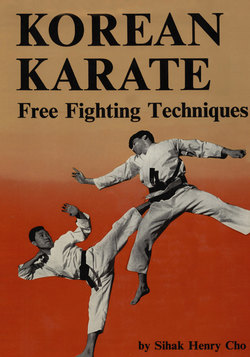Читать книгу Korean Karate - Sihak H. Cho - Страница 12
На сайте Литреса книга снята с продажи.
Оглавление2 Tae-Kwon Do, the Korean Karate
Korean karate (tae-kwon do) can be traced to tae kyun, a form of kicking- and leg-maneuvering exercise long a part of Korean history. Some authorities have stated that tae kyun was taught and practiced among Hwarang-do over 1000 years ago. Hwarang-do was organized as a national group of outstanding youths who were hand picked for training in swordsmanship and archery, and also to study to become military leaders of the country of Silla which was then one of the three ruling countries of Korea until all three were later unified by Silla in the 7th century.
It is assumed that tae kyun was practiced as part of the daily curriculum by the Hwarang-do, who lived deep in the mountains or near waterfalls enjoying the surroundings of nature, their daily life isolated from the confusion characteristic of the disorganized human society of that time. Initially, to those who were planning to be professional soldiers, ruling officials or leaders of the people, tae kyun was merely a form of bodily training and physical conditioning. As time passed, however, tae kyun is believed to have been influenced by karate which must have been introduced from the neighboring country of China. Before and after the powerful Tang (Kara) period of China, karate is assumed to have spread out into many countries throughout Asia along with the cultural exchange of Buddhism and other philosophies.
Tae kyun, which was not primarily based on the Buddhist doctrine, did not have national support during the period of the Koryu Kingdom of Korea (A.D. 918 to 1392). Koryu, which experienced a flowering Buddhist culture, became widely known throughout the world as Korea, which was derived from the pronunciation of Koryu. The reign of the Yi dynasty which followed the Koryu dynasty was unfortunately characterized by national chaos and social confusion which lasted for over 500 years until the beginning of the 20th century. The replacement of Buddhism by Confucianism at that time resulted in power struggles and ideological confusion. During this period, it is believed that tae kyun was practiced by a small select group who did not share their expertise with the people at large. The modern karate of Korea, with very little influence from tae kyun, was born with the turn of the 20th century when it was imported directly from China and also from Okinawa through Japan.
